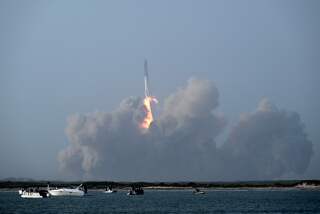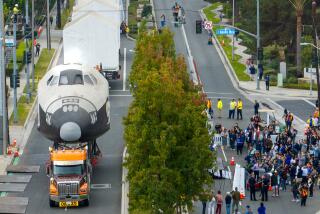Richard Branson unveils his space plane
- Share via
MOJAVE — A souped-up aircraft that would help boost well-heeled thrill seekers into the outer atmosphere was unveiled Monday, lifting the prospects for travelers to one day fly in a commercial spaceliner.
After keeping the project shrouded in secrecy for more than three years, project developers dropped the curtain on the White Knight Two, an odd-looking aircraft with two airplane bodies joined at the wings and resembling a flying catamaran.
And that was just the mother ship, designed to ferry an eight-person rocket from the Earth’s surface to a launch point 48,000 feet up.
Still under construction is the rocket-powered passenger ship, dubbed Space Ship Two, which would be attached to the mother ship and carried to its launch altitude.
There the rocket ship would be released and its engine ignited, hurtling it up to an altitude of 360,000 feet -- the edge of space -- where passengers and crew would experience about four minutes of weightlessness. The craft would then drift back to Earth and land at an airport like a plane. Elapsed time from takeoff to touchdown: about 2 1/2 hours.
Space Ship Two could be ready for flight tests next year. If all goes well, the first spaceflight is expected by the end of the decade.
The mother ship was revealed at a much-hyped ceremony at the Mojave Air and Space Port, about 95 miles north of Los Angeles. The spaceport is the home of the aircraft’s developer, Scaled Composites, a Northrop Grumman Corp. subsidiary founded by famed aircraft designer Burt Rutan.
The maverick engineer has built such pioneering aircraft as the Global Flyer, which shattered aviation records by flying around the world on one tank of fuel.
On hand for the ceremony were Rutan and British billionaire Richard Branson, who bankrolled the project. In typical Branson fashion, the aircraft was unveiled in front of about 150 journalists, many of them flown in by Branson’s U.S.-based carrier, Virgin America, for the two-hour affair. The plane was painted with the message, “My Other Ride Is A Spaceship.”
After the media were corralled into a hangar, a massive white curtain was dropped to reveal the White Knight Two.
Sitting alone, tucked in a corner and covered in black so it could not be seen was Space Ship Two.
Both vehicles are larger versions of the mother ship and rocket that made the first privately funded suborbital spaceflight four years ago. Unlike most of today’s planes, which are made of aluminum and other metals, the space launch vehicles are built with composite materials.
“This is quite something, isn’t it?” Branson said, after unveiling the mother ship to a throng of television cameras and reporters. “It’s one of the most beautiful, extraordinary aviation vehicles ever developed.”
The rollout at the remote desert airport here came a year after a deadly accident killed three Scaled Composite engineers who were testing an engine for a rocket ship nearby. It and other development problems set back the effort to launch the first commercial spaceflight initially set for this year.
During the ceremony, Branson also revealed that he was naming the mother ship after his own mother, Eve, a former “air hostess” who attended the rollout, and that the first passengers would be his family, including his mother and father.
“If you are going to build a mother ship, it’s only right that you should name it after your mother,” Branson said.
So far, the first 100 wannabe astronauts have paid $200,000 for a chance to float weightlessly in space. An additional 175 have put down deposits of $20,000 or more.
Many of those who have signed up are deep-pocketed thrill seekers who are running out of adventures on Earth, said Matthew Upchurch, chief executive of Virtuoso, a Forth Worth luxury travel agency that is booking passage on the spaceflights.
“One of our customers has climbed every peak in the world,” Upchurch said.
Eric Wittenberg, a retired home builder and a Laguna Beach resident, paid $200,000 three years ago to “find out the difference between the deep sea and space.”
An avid scuba diver, Wittenberg has dived in a submersible to depths of more than 10,000 feet. “Now I want to know what it’s like up there.”
But he would like Branson and Rutan to hurry it up: “Safety is first, but I’m 75 years old,” Wittenberg said. “So for me, sooner is better if you know what I mean.”
More to Read
Sign up for The Wild
We’ll help you find the best places to hike, bike and run, as well as the perfect silent spots for meditation and yoga.
You may occasionally receive promotional content from the Los Angeles Times.






